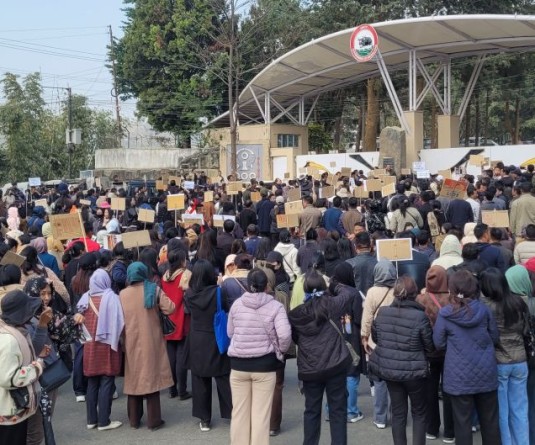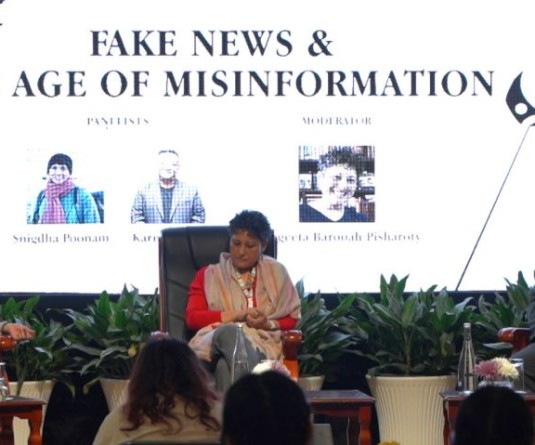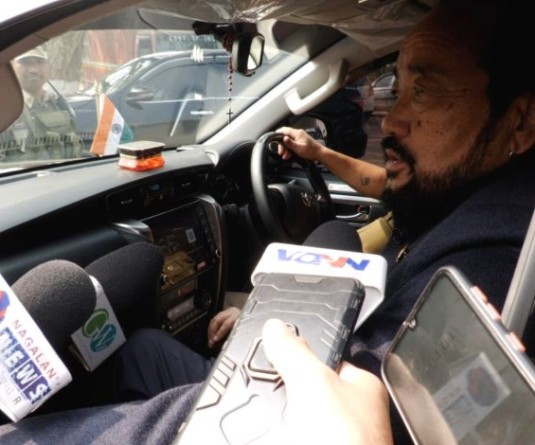A banner in front of a morung at the Naga Heritage Village, Kisama demanding immediate repeal of the AFSPA in the aftermath of the December 4 killings in Oting. (Morung File Photo)
 - Copy.jpg)
Appeals to President of India to repeal Act
Kohima, December 15 (MExN): The Naga Club has written a representation to the President of India seeking immediate repeal of the Armed Forces (Special Powers) Act, 1958 which it said, was a “symbol of abuse, oppression and discrimination.”
While the nation needs laws to counter separatist movements, it must review the situation in which the law is being exerted, it said, asserting that “the situation in Nagaland has changed from the 1950s to the 1990s.”
In the open representation, Naga Club President Kuolachalie Seyie and General Secretary K N Mhonthung Lotha stated that the recent “massacre” committed by the Para commandos of the Indian Army in Oting village of Mon district on December 4 where 14 innocent civilians were killed and several others injured, has sparked civil unrest among the Nagas. It has brought back memories of the decades of hardship, pain and humiliation endured by the Nagas in our quest for self-determination and live as a free nation, it said.
Stating that AFSPA has earned notoriety for engendering a culture of immunity to forces operating in conflict areas, the Naga Club highlighted the circumstances under which the act was promulgated by the British to suppress the quit India movement and its subsequent implementation by the Indian government after a new ordinance was adopted and received the assent of the President on September 11, 1958.
“The AFSPA gives the armed forces wide power to shoot, to kill, arrest, conduct warrantless searches and demolish structures in the name of ‘aiding civil power,’” the representation stated, while citing incidents where soldiers, “equipped with these special powers” committed “some of the most unimaginable human rights atrocities in free India’s history,” including rape and torture.
Notably, it mentioned the ‘genocide’ at Matikhru village in 1960; the atrocities in Yenkeli village in 1971 as well as 1956 even before the AFSPA came into force; the 1987 Operation Blue Bird in Oinam village and its surrounding areas; the 1994 ‘massacre’ and arson at Mokokchung, among others.
It also highlighted examples of “the volatile environment in places militarized under AFSPA” by citing the 1995 incident in Kohima where “The Rashtriya Rifles began shooting indiscriminately mistaking the sound of a tyre bursting in their convoy for a bomb attack,” resulting in several civilian deaths and injuries.
Further, the Naga Club cited a passage from the book ‘My Years with Nehru’ written by former Chief of Indian Intelligence B N Mullik: “Troops moved into Tuensang by October 1955 and the war with the Nagas started from thence,” referring to it as “proof of the offensive nature of their invasion into the territory of the Nagas.”
“There are hundreds of instances of AFSPA being forcefully used in the guise of quelling the separatist movement which were gone unnoticed to the outside world because it was ignored by the media and went unreported,” the representation stated.
Terming the act as a “specific area-targeted draconian law” which has apparent disregard for the constitutionally granted rights to the life of those in conflict areas, it further contended that the Act was against the Constitution of India which states that “the armed force cannot be deployed internally against the Indian citizens unless the government ask the Army to do so.” Taking this perspective into account, it argued that “Nagas are a separate entity.”
It also referred the recommendation made by the Justice BP Jeevan Reddy committee in 2005 and said that “AFSPA is not the answer to the decades old problem of the Nagas. Political will is the answer to this longstanding Indo- Naga issue.”
Making its appeal, the Naga Club stated that, the public has witnessed peaceful atmosphere since the ceasefire and the negotiation started in 1997, it asserted that “The Act which was passed by independent India to suppress the freedom movement of the Naga people should be repealed and ended with the liberation of the Naga People.”






